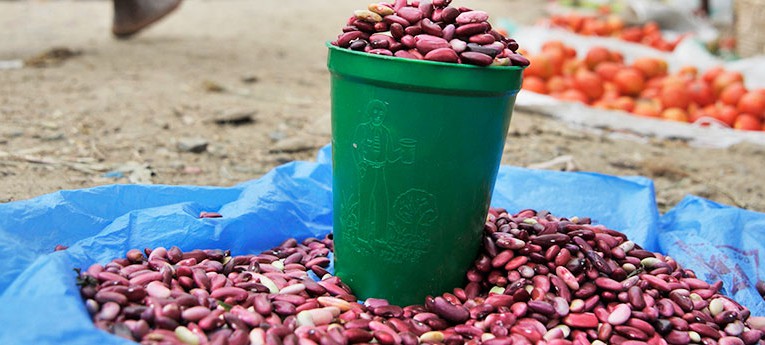
by Leanna M. Sweha
The Global Food Security Symposium, sponsored by the Chicago Council on Global Affairs, was held last week in Washington, DC. The symposium emphasized the critical linkage between sustainable food systems, nutrition and health. There were also some clear links to California and UC Davis.
Former USDA Secretary Dan Glickman, Co-chair of the Council’s Global Agricultural Development Initiative, introduced the Council’s report: Healthy Food for a Healthy World: Leveraging Agriculture and Food to Improve Global Nutrition. The report calls on the US to use the power of the agriculture and food sector to reduce malnutrition (both over-nutrition and under-nutrition) across the globe.
The report recommends that:
- The US government commit to a long-term global food and nutrition strategy focused on agricultural development.
- The US government, in partnership with universities and research institutes, increase funding for research to expand production of and access to diverse, nutrient-rich foods.
- Government and industry work together to support more efficient and wider delivery of healthy foods, especially through technologies that can reduce food waste and enhance food safety.
The report was endorsed by a bipartisan group of policy, business, scientific, and civil society leaders, including former California Department of Food and Agriculture secretaries A.G. Kawamura and Ann M. Veneman.
USDA Secretary Tom Vilsack gave the keynote address, noting that the US Feed the Future Program is helping to fulfill the report recommendations.
Feed the Future is a multi-agency global hunger and food security initiative that supports partner countries in developing their agriculture sectors for economic growth and trade, with a focus on smaller farms and empowering women.
UC Davis has received funding to lead a number of Feed the Future programs:
- Agricultural and Resource Economics Professor Michael Carter leads the $25 million “BASIS Assets and Market Access Collaborative Research Support Program,” which designs and tests financial tools, such as linked credit and insurance contracts, to reduce small farmer vulnerability to risk.
- Elizabeth Mitcham, PhD, Pomologist and Cooperative Extension Specialist, leads the $18.75 million “Innovation Lab for Collaborative Research on Horticulture,” which tests and adapts new innovations in fruit and vegetable production and post-harvest preservation, in collaboration with other universities, entrepreneurs, farm extension agents, and governments in multiple countries.
- Associate Professor of Animal Science Huaijun Zhou leads the $6 million “Feed the Future Innovation Lab for Genomics to Improve Poultry,” which is breeding chickens that can tolerate hot climates and resist infectious disease.
- Plant Pathology Professor Doug Cook leads the $4 million “Feed the Future Innovation Lab for Climate Resilient Chickpeas,”is improving the yield, climate resilience, nutritional value, and nitrogen-fixing properties of chickpea varieties selected in consultation with local farmers in multiple countries.
Vilsack stated that he hopes Congress will pass H.R. 1567, the Global Food Security Act of 2015. The bi-partisan bill would authorize and codify international food security programs, including the Feed the Future program, that focus on the productivity, incomes and livelihoods of small-scale producers, particularly women, by working across agricultural value chains and expanding farmers’ access to local and international markets.
Andrew Margenot, a UC Davis PhD candidate in Soil Science and Biogeochemistry, attended the symposium as a “Next Generation Delegate.” He was part of a select group of graduate students in food and agricultural programs invited by the Council to engage in symposium discussions and to interact with leaders in agriculture and nutrition.
Margenot, who spent 14 months as a visiting researcher at the International Center for Tropical Agriculture in Kenya, noted that central to his professional goals as a soil scientist is to make use of small farmers’ knowledge to identify successful soil management strategies.
“Smallholders are facing significant crop production challenges because soil degradation by nutrient mining and erosion threatens the resource base of food production. To maintain and improve productivity, farmers need to invest in soil management, but they often lack the tools and opportunities. To address these issues, my work on food security in East Africa facilitates the capacity of smallholders to improve soil management through participatory, bottom-up approaches.”
Leanna M Sweha, JD, has been a resident of Davis for 20 years. As a young molecular biologist in a USDA lab working to engineer Roundup-resistant corn, she grew interested in sustainable agriculture. Fascinated with the legal and policy issues of agricultural genetics, she became an attorney specializing in agricultural and natural resources law. She has worked for the California Resources Agency and the UC Davis Office of Research.

“The report calls on the US to use the power of the agriculture and food sector to reduce malnutrition (both over-nutrition and under-nutrition) across the globe.”
this is an interesting counterpart to the eco-modernist series, because this is part of what the eco-modernists are calling for. i think this is in the best interest of our nation in a lot of ways – reducing serious inequality will produce a far more stable populace of the planet.